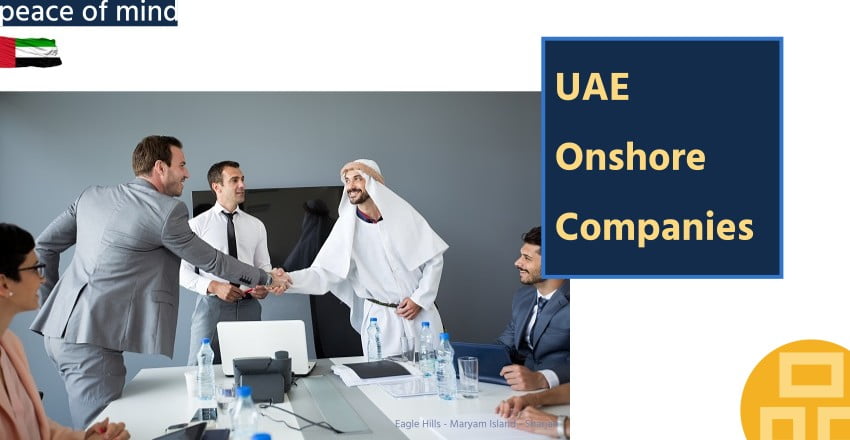UAE Onshore Companies
UAE Onshore Companies are necessary if one wishes to engage in local business.
No minimum paid-up capital requirement for UAE Onshore Companies.
UAE Onshore Companies
UAE Onshore Companies are necessary if one wishes to engage in local business. However, most of our clients do not wish to do so. Freezone companies are still able to sell goods and services to the local market of the Emirate where they are registered, under certain conditions defined by the type of business. They are also able to sell to local markets of those Emirates where they are not registered.

UAE Onshore Companies, also referred to as UAE Mainland Companies, or as DED Companies (because they are registered with the UAE Department of Economic Development), require that 51% of the shares are held by a local partner, referred to as Sponsor. The local Sponsor will have to sign all documents related to the UAE Company Formation. The local Sponsor will not interfere in the business of the company and will not be entitled to receive dividends from the company or a salary. These important conditions are typically manifested in a separate legal agreement with the Sponsor. Sponsors receive an annual fee for their provision as a shareholder. We would be happy to suggest reliable local Sponsors.
There is no minimum paid-up capital requirement for UAE Onshore Companies. Banks, however, would like to see during an application for bank account opening that a company has the financial strength needed to conduct the business planned.
The most preferred legal form of UAE Mainland Companies is the Limited Liability Company, LLC. There are no restrictions for UAE Mainland Companies in respect of the business carried out. UAE Mainland Companies (= UAE Onshore Companies may conduct business anywhere in the UAE, including its Free Zones.
UAE Onshore Companies are required to operate under valid business licences. The business licence with the widest scope of activities is a “Commercial Licence”, formerly called “General Trading Licence”. A UAE Commercial Licence includes all kind of business where buying and selling is involved, plus a few other activities such as real estate agent activities, car rental activities etc. Some activities require additional licences from other authorities, for example in the area of health or educational services.
The Department of Economic Development (DED) is the main regulatory body for the formation of companies in mainland Dubai; UAE Mainland Companies must be registered with the DED.
UAE Onshore Companies need to acquire office or commercial space in order to receive a business licence. The minimum size for an office to receive a business licence is 200 sq ft.
UAE Onshore Companies are entitled to benefit from UAE Residence Visa for the foreign shareholder(s) and additional foreign employees. Unlike Freezone Companies, the number of UAE Residence Visas is not limited per definition but mainly depend on the size of premises and type of business of the UAE Onshore Company.
UAE Onshore Companies receive “E-quotas” (electronic quotas) that entitle them to apply for Resident Visas for shareholders and employees. The e-quota system is flexible, meaning that the quota can easily be increased while the company is growing.
UAE Onshore Companies with 100% Foreign Ownership
There are some exceptions to the 51% local partner rule. In those cases, as listed below, the foreign shareholder or owner is required to hire a Local Service Agent, which might be an individual or a company 100% owned by UAE citizens. The Local Service agent is responsible for all administrative dealings with governmental departments, like obtaining professional licenses, residence visa, labour cards, etc.
The following cases of UAE Onshore Companies are permitted to be 100% foreign-owned:
- UAE Branches of foreign companies can be 100% owned by the foreign parent company.
Foreign Branch Offices can be set up as a UAE Representation Office. A UAE Representation Office is only permitted to act as a marketing office for its parent company; it is not allowed to engage in trade.
UAE Foreign Branch Offices may also be set up as so-called Full Foreign Branch Office. UAE Full Foreign Branch Offices are allowed to engage in the same activities that the parent company is engaged in.
UAE Branch Offices are considered as extensions of their parent companies and do therefore not have a legal identity on their own. - Professional Sole Establishments; these are establishments of professionals who deliver service based on their profession, knowledge and experience, rather than conducting any sales of products. Professional Sole Establishments can have one individual owner only.
- Civil Establishment, which is a business partnership for professionals in particular fields. All its owners must be individuals. In some cases, civil establishments must comply with the 51% local partner requirement, for example civil establishments that conduct engineering activities.